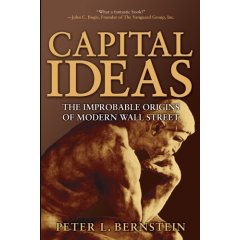Capital Ideas and Real Estate Futures Markets
As you know if you read this blog, I post from time to time on the topic of economics. Not that I have much expertise in the subject beyond 14.01, 14.02, and a subscription to The Economist, but it intrigues me. In particular, markets (stock, bond, futures, predictive, etc) are fascinating.
 On that particular topic, I just finished reading Capital Ideas by Peter L. Bernstein. It's an amazing book about the history of the people and ideas that formed the theoretical groundwork that the modern stock market and its derivative markets runs on.
On that particular topic, I just finished reading Capital Ideas by Peter L. Bernstein. It's an amazing book about the history of the people and ideas that formed the theoretical groundwork that the modern stock market and its derivative markets runs on.I'm a big fan of Bernstein. He's a great storyteller and knows how to explain technical concepts to laymen with the right historical context to make it all make sense. One of his other books, Against The Gods, about the history of the concept of risk from modern times back to the ancient Greeks, is also outstanding. I highly recommend either book.
One of the topics covered in Capital Ideas is the method of using options and futures to hedge against risk. The book was written in 1992, before the current hedge fund boom, and most of the attention focuses on LOR's Portfolio Insurance that was popular in the 80's and demonized after the '87 crash. It's an intriguing concept that I'd like to learn more about.
Coincidentally, just the other day I also ran across on article in The Economist about the opening a futures market in Chicago tied to housing prices. It's not at all clear if your average homeowner can use such a market, but given the volatility of home prices, it's a cool idea. I wonder how many ways there might be to diversify your risk in owning a home. One idea that popped into my head was selling off "shares" in your home, keeping a controlling block of at least 51% of them yourself. The idea would be that you sell off part of your home and buy shares in other people's houses in other markets. That way, if a market in one location tanks, you're not exposed to all the risk.
I have no idea if such a scheme could actually work. A home is such a different asset than a stock that it's tough to know how to start. First of all, there are no dividends or profit being returned by owning a home. Instead, it's all the value you get out of living there, plus any upward change in price. You also have to figure out how mortgage payments get split up, who pays the taxes, etc. Who knows, but it sure would be nice to be able to diversify the biggest asset that most people every own. Any thoughts?


1 Comments:
Interesting idea and it already exists although not precisely how you described it. There are two sides of what you mentioned: being able to sell a portion of your house and being able to buy real-estate exposure in other markets/regions.
The first part is easy if you think of it as a loan instead of an equity stake -- any time someone get s mortgage they're effectively "selling" a portion of the house by borrowing money and using the house/property as collateral. You could theoretically create a similar product where a bank buys a portion of your house and shares in the upside/downside of price appreciation/depreciation but it usually doesn't make sense to do for residential housing (this is done frequently in commercial real-estate).
Main reason is that most banks don't want to take an equity interest in a family/individual -- corporations/hotels/stores are much easier to value.
The other side is getting diversified exposure to real-estate markets away from where you live. This can be achieved by investing in REIT's, mortgage lenders/banks (who theoretically should make money if the housing markets remain hot), or in regular mortgage-backed securities. While it's not the same as having an equity stake in another person's house, it's not clear that most consumers want the ability to buy a portion of someone's house for the sake of diversifying away from their regional housing market. How would they know who the family is? What happens if that family moves and an individual with much worse credit moves in? Do you have to sell when the family sells?
In conclusion, yous gots to diversify yo bonds.
Post a Comment
<< Home